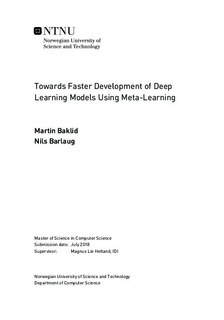| dc.description.abstract | Deep learning has, in relatively few years, improved significantly the performance of many machine learning applications. Even though its popularity has surged, it's not always easy to apply deep learning to a real-world problem. Developing a good deep learning model is a process that most likely will include several iterations of data collection, training and hyperparameter tuning. One big obstacle in this process is the hunger for data and compute power. Supervised learning often requires a massive amount of annotated examples, and training usually extends over hours or days. This makes the process of developing deep learning models very time and resource consuming. In this thesis we investigate if recent advances in few-shot learning can be used to speed up this process, and look specifically at object detection as an example. Such methods could potentially decrease both the necessary number of examples and the training time.
MAML is a promising few-shot learning method based on meta-learning that optimizes the initial parameters of a model to be best possibly suited for fine-tuning. It's model-agnostic by nature and can in principle be applied to most deep learning models. But through extensive exploration we show that it's far from trivial to apply MAML to object detection on natural images. However, we are able to use a simpler method inspired by MAML, Reptile. We show that a model pretrained using Reptile can be fine-tuned considerably faster than a model pretrained normally on object detection, but surprisingly it does not enable using fewer examples. In addition, we show that Reptile is able to speed up the development of deep learning models in practice. This is done by building a proof of concept tool and use this to test some example use cases. | |

